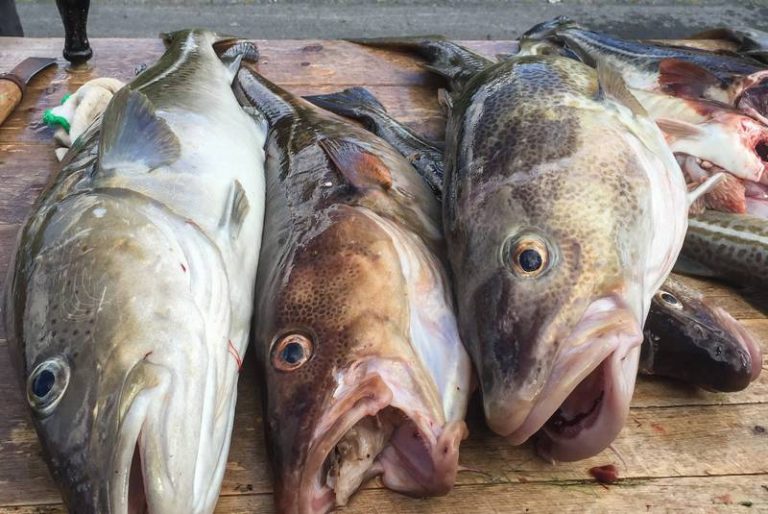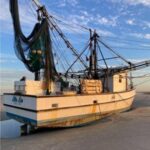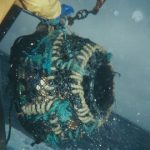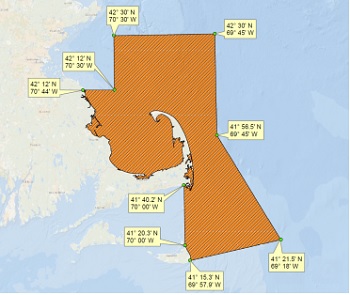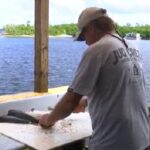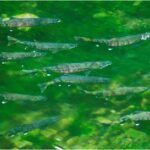Tag Archives: University of Maine
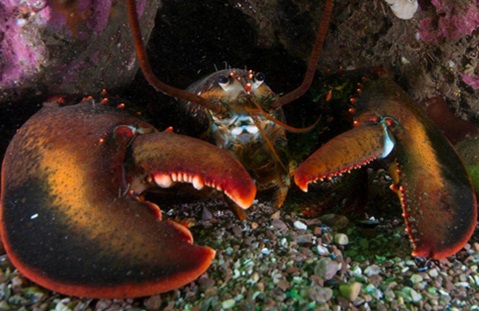
American lobster population, habitat preferences shifting, study finds
American lobsters along Maine’s coast have relocated to new habitats, while the population simultaneously shrunk in abundance and grew older, according to a new study by University of Maine researchers. For decades, the vast majority of adult lobsters resided in majority of adult lobsters. This knowledge helped inform longtime conservation efforts and regulations within the more than $740 million fishery. A team of UMaine scientists, however, found that from 1995-2021, occupancy of boulder habitats dropped 60%. Meanwhile, the number of lobsters residing in sediment or featureless ledge habitats, both of which have little to no geological features to use as shelters, increased 633% and 280%, respectively. Lobster population density across all types of habitats declined too, meaning they are fewer in number and their populations are more spread out. more, >>CXLICK TO READ<< 16:20
BOEM issues first floating offshore wind lease in the US
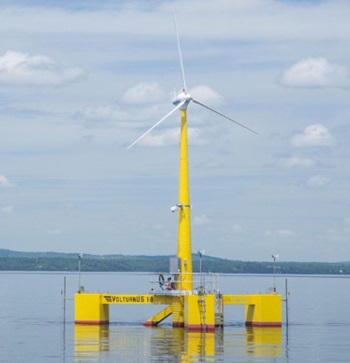 The lease area where the floating turbines will be deployed covers an area of approximately 15,000 acres located 28 nautical miles offshore Maine on the US Outer Continental Shelf. The area could allow for the deployment of up to 12 floating offshore wind turbines capable of generating up to 144 MW of renewable energy. The research array will allow the state, the fishing community, wildlife experts, the offshore wind industry, and others to conduct in depth studies and thoroughly evaluate floating offshore wind as a renewable energy source. As proposed, the research array will use floating foundation technology designed by the University of Maine and deployed by its development partner, Diamond Offshore Wind. UMaine’s floating platform, known as VolturnUS, was recently awarded a US$12.5M grant from the US Department of Energy. more, >>CLICK TO READ<< 07:28
The lease area where the floating turbines will be deployed covers an area of approximately 15,000 acres located 28 nautical miles offshore Maine on the US Outer Continental Shelf. The area could allow for the deployment of up to 12 floating offshore wind turbines capable of generating up to 144 MW of renewable energy. The research array will allow the state, the fishing community, wildlife experts, the offshore wind industry, and others to conduct in depth studies and thoroughly evaluate floating offshore wind as a renewable energy source. As proposed, the research array will use floating foundation technology designed by the University of Maine and deployed by its development partner, Diamond Offshore Wind. UMaine’s floating platform, known as VolturnUS, was recently awarded a US$12.5M grant from the US Department of Energy. more, >>CLICK TO READ<< 07:28
The Lobster Institute at UMaine has a new executive director
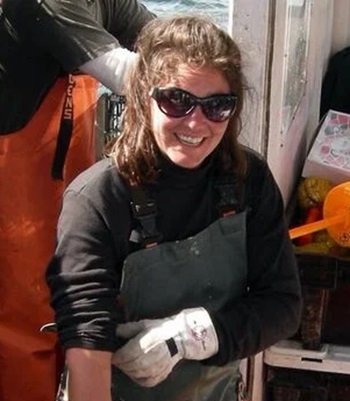 Maine native and University of Maine graduate Christina Cash has been named executive director at the university’s Lobster Institute. Serving as the interim director since last summer, Cash succeeded Richard Wahle, who retired from the role at that time. Cash has been with the institute since 2021. Before serving as interim director, she was the assistant director of communication and outreach. Cash is a former first mate, captain and lobster boat owner and operator, and holds an active captain’s license. In her new role, she will oversee the creation of a new executive committee, with subcommittees planned for outreach, research, workforce and other focus areas. more, >>CLICK TO READ<< 11:50
Maine native and University of Maine graduate Christina Cash has been named executive director at the university’s Lobster Institute. Serving as the interim director since last summer, Cash succeeded Richard Wahle, who retired from the role at that time. Cash has been with the institute since 2021. Before serving as interim director, she was the assistant director of communication and outreach. Cash is a former first mate, captain and lobster boat owner and operator, and holds an active captain’s license. In her new role, she will oversee the creation of a new executive committee, with subcommittees planned for outreach, research, workforce and other focus areas. more, >>CLICK TO READ<< 11:50
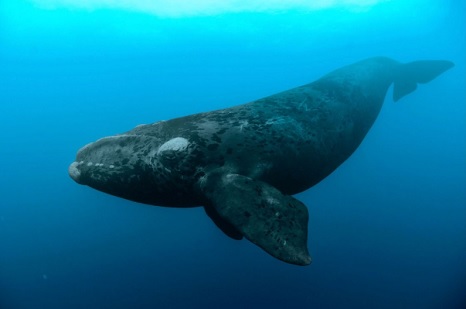
Are right whales big business for nonprofits?
Forget the green economy, the deep blue economy has it beat by a nautical mile. Ever wonder how much money is spent trying to protect the North Atlantic right whale? Ask any of the non-profit corporations that participate in funding to save them. Here in Maine, at least nine non-profit organizations support right whale conservation efforts, in addition to state agencies and the University of Maine. Nationally, the North Atlantic Right Whale Consortium shows 47 environmental organizations it identifies as “partners” on its website. Another 37 environmental groups signed a PEW charitable trust letter to Congress last March, critical of what it believed to be too little funding to protect the species. more, >>click to read<< by Jane Carpenter 08:36
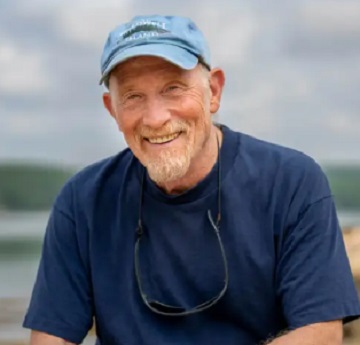
UMaine researcher who helped reshape marine science in Maine retires
When Bob Steneck came to the University of Maine in 1982, there were few marine ecologists in the state, and none interacted with fishermen. He was among the first in Maine to work with lobstermen on research, traveling with them on their boats, diving to the seafloor to study lobsters and sharing his findings with them. At that time, there was a scientific consensus that the lobster population in the Gulf of Maine was declining. By working with lobstermen and diving down to the depths of the gulf, Steneck showed that the population was actually on the rise. Steneck’s work and that of his students and colleagues helped propel an expansion of and change in how lobster fisheries research is conducted in Maine. Over the preceding decades, Steneck’s students continue collaborating with lobstermen and other fishermen on their studies. >>click to read<< 10:05

Scientists see long-term hope for Maine’s lobster fishery despite warming waters
Dire predictions about the effects of global warming on Maine’s lobster population may be exaggerated and underestimate the potential that conservation measures have to preserve the fishery into the future. The UMaine scientists are now projecting that temperatures in Gulf of Maine will likely remain within lobsters’ comfort zone because of the gulf’s unique oceanographic features, though changing ocean currents are harder to predict. The researchers cautioned that the dynamics of global warming are complex and make it difficult to project far into the future with certainty. >click to read< 16:21
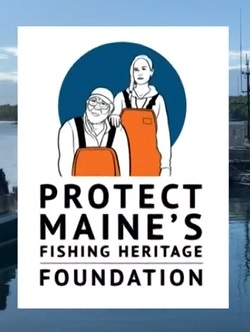
Maine is being set up to sell its coastline to Industrial Scale Aquaculture
On March 18th, a letter was sent to Gayle Zydlewski the Director of the Maine Sea Grant College Program, signed by several academics from the University of Maine, Bates College, scientists, business owners, students, members of the 2003 Aquaculture Task Force, and a former Department of Marine Resources Commissioner, calling into question whether the report, in part directed by the Maine Aquaculture Association, is simply a promotional tool for large scale industrial aquaculture. The report is more of a railroading than a roadmap, Protect Maine’s Fishing Heritage Executive Director Crystal Canney said, “The 10-year aquaculture roadmap is an economic development plan that isn’t about what’s best for Maine but what is best for large scale industrial aquaculture. >click to read< 14:45

Are the whales leaving with the food? Gulf of Maine research raises questions about new lobstering rules
As the Gulf of Maine’s waters warm, recent studies show the main food source of the endangered North Atlantic right whale is moving north, out of Maine waters. And the whales appear to be following them. Such findings haven’t escaped the notice of the Maine lobster industry, which has been referencing them in its legal arguments as to why impending new federal restrictions on lobstering gear won’t help save the whales. Oceanographer Jeffrey Runge, of the University of Maine and the Gulf of Maine Research Institute, said the lipid-rich copepods have been abundant in the Gulf of Maine since Henry Bigelow did his first oceanographic surveys in the early 20th century, but that abundance has dropped by about 70 percent in the past 20 years. >click to read< 11:57
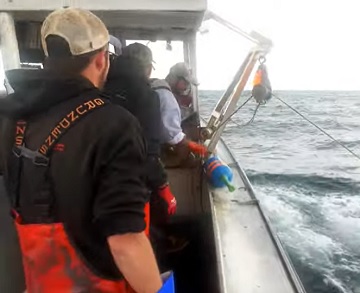
Save the Gulf of Maine – The Maine Reset, Ep. 4: Never Forgotten
Derek Colbeth grew up lobstering, and then served for 5 years in the US Marine Corps. Now he’s a civilian again, but his heritage and livelihood is under attack on all fronts. Powerful interests are converging in a war against Maine Lobstermen. If Lobstermen lose this fight, Maine will never be the same. >Video, click to watch< 14:35
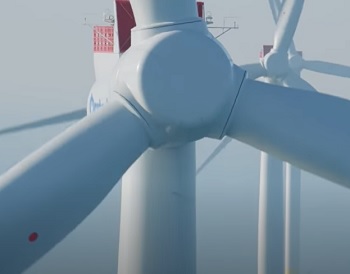
Save the Gulf of Maine – The Maine Reset, Ep.3: This is an Experiment
In this episode, interviews with two brilliant people that you won’t want to miss regarding offshore wind development in Maine. Carla Guenther PhD brings an oceanography perspective, and Long Island Commercial Fisherman Steve Train lays out some practical wisdom as only a fisherman can. Sandwiched in there are some of my own antics lampooning the empty suits from corporations who want to confiscate our ocean., >Video, click to watch< 13:15 ocean industrialization
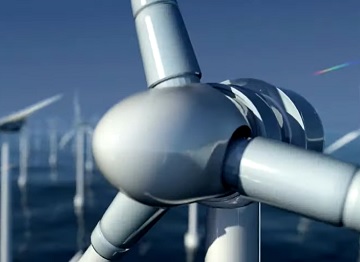
Save the Gulf of Maine – The Maine Reset Part 2, Fait Accompli?
First, we look at a basic chronology of the interplay between the State of Maine, the University of Maine, and private entities RWE Renewables and Diamond Offshore Wind (subsidiary of Mitsubishi) as they have joined forces in a venture of enormous importance. They partnered on a prototype of future wind turbines (Aqua Ventus I). Then they began working on an array of a dozen turbines. How many more turbines will follow? The wind developers have been clear that the first array is only the beginning of industrializing the Gulf of Maine. Then, we look in detail at some of the likely 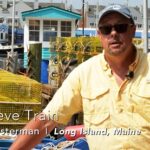 environmental impacts of industrial floating wind on marine life. It’s not a pretty picture. Yet, many large entities whose missions include protecting the environment have given ocean industrialization their blessing. Will they change their minds when they learn the full scope of impact? Video, Click to watch<, Watch the first episode, Road to Disaster – Voices of Maine Lobstermen >click to watch< 11:01
environmental impacts of industrial floating wind on marine life. It’s not a pretty picture. Yet, many large entities whose missions include protecting the environment have given ocean industrialization their blessing. Will they change their minds when they learn the full scope of impact? Video, Click to watch<, Watch the first episode, Road to Disaster – Voices of Maine Lobstermen >click to watch< 11:01
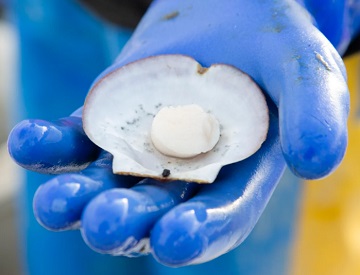
As Maine’s climate changes, scallop farming offers optimism
“One of the reasons we started farming scallops was because even though there’s a hesitancy for most people to admit it, there’s an awful lot of storms on the horizon for the lobster industry,” said Alex de Koning, of Bar Harbor-based mussel and oyster farm Acadia Aqua Farms. “It’s a tough nut to crack, but if you crack it, your potential benefits are just tremendous.”,, Marsden Brewer, owner of PenBay Farmed Scallops in Stonington, has been a commercial fisherman for most of his life. When his son, Bob, was in high school, Brewer worried about what the future would hold. Neither ground fishing nor lobstering seemed like a stable occupation,,, “I got tired of worrying about limitations,” he said. “I wanted to do something where I could maybe realize my potential.” >click to read< 13:11
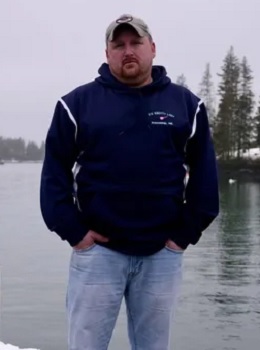
Maine lobstermen protest Monhegan-area wind project
More than 80 lobster boats lined up between Monhegan Island and Boothbay Harbor on Sunday to protest a seabed survey for a planned offshore wind turbine near Monhegan. “The boat hasn’t been staying in the survey route, and there’s been some issues with gear loss,” Dustin Delano, a lobsterman from Friendship who helped organize the protest, said this weekend. Delano estimated that more than 80 boats joined him around 9 a.m. Sunday south of Monhegan Island, where a 12-megawatt test turbine billed as the first commercial-scale project in the nation would demonstrate the 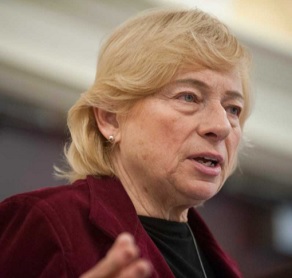 viability of offshore wind as a renewable power source. The fishermen formed a single-file line that Delano said stretched roughly 2 miles, and then traced the route back to land. >click to read< 07:05
viability of offshore wind as a renewable power source. The fishermen formed a single-file line that Delano said stretched roughly 2 miles, and then traced the route back to land. >click to read< 07:05
Dozens of lobster boats gather off Monhegan to protest floating wind turbine – Gov. Janet Mills is proposing to build more of the floating wind turbines farther offshore in the Gulf of Maine. video, >click to read<
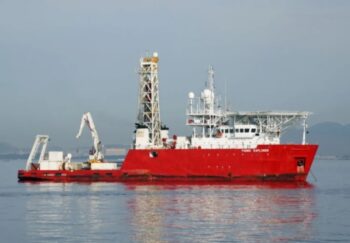
Undersea cable survey marks milestone in Maine’s offshore wind quest
Three marine vessels that study the makeup and geology of seabeds are scheduled to arrive in Maine over the next week or so to survey the proposed route of an underwater cable that will link a floating, offshore wind turbine near Monhegan Island,,, The project received a major boost last August when Diamond Offshore Wind, a subsidiary of Mitsubishi Corp., and RWE Renewables, the world’s second-largest offshore wind company,,, While the location of offshore wind turbines has gotten a lot of attention, the siting of the cables that connect turbines received less scrutiny, according to Annie Hawkins, of RODA, >click to read< 15:25
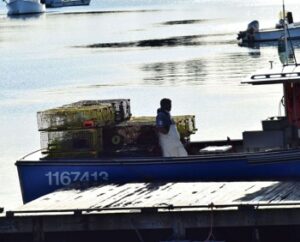
Lobster stock levels remain high in Gulf of Maine, but there is cause for concern
The “now” looks solid for local commercial lobster fishery, based on findings reported in the 2020 Atlantic States Marine Fisheries Commission Lobster Benchmark Stock Assessment, which reported the stock at “record high abundance levels.” The good news continued,, The news for southern New England, including southern Maine, remained poor, with a depleted fishery and no signs of resurgence. The research was conducted by several organizations, including the Department of Marine Resources, Gulf of Maine Research Institute and the University of Maine’s Sea Grant program and Lobster Institute. The assessment, released in October, was based on surveys conducted from 2016 through 2018. However, once the research turns to lobster settlements the future does not look as bright. >click to read< 18:29
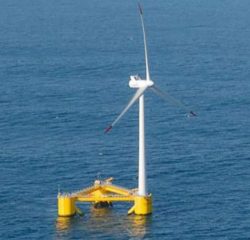
Maine Governor Janet Mills plans to create 1st floating offshore wind research farm in US
Gov. Janet Mills said Friday that she plans to create the nation’s first floating offshore wind research farm in the Gulf of Maine,,, The site of the array, which is expected to contain up to a dozen floating wind turbines, is undetermined but will be 20 to 40 miles offshore in an area that would allow a connection to the mainland electric grid for the southern half of the state.,, Mills has directed the Governor’s Energy Office to collaborate with the commercial fishing industry and other state agencies,,, >click to read< 18:10
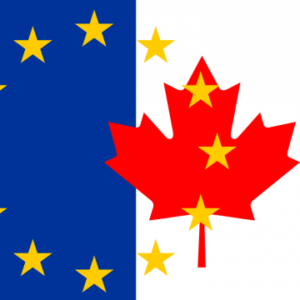
Trade minister says she’ll keep eye on U.S. probe of Canadian lobster industry
The Canadian industry gained most of the Chinese market that the Americans lost after China slapped a 35 per cent tariff on U.S. lobster exports. Canada also saw its lobster exports grow in Europe after it signed the Comprehensive Economic and Trade Agreement, or CETA, with the European Union, giving it a tariff advantage over its U.S. competitors. The Trump administration, however, has recently signed an agreement with China that removes the 35 per cent tariff. And a separate deal with Europe also removed tariffs on American lobsters that had provided the Canadian industry an advantage. Executive Director Geoff Irvine (Lobster Council of Canada) said Monday the lobster industries of Canada and the United States are now back on an even playing field. >click to read< 07:17
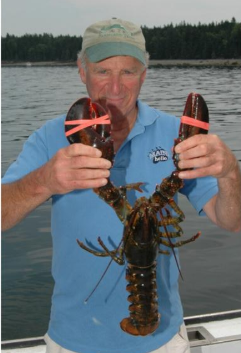
Lobster may lead to Coronavirus treatment
A Maine-based researcher and professor is optimistic a treatment for the global pandemic could be hiding in plain sight and Maine waters: in lobsters’ circulatory fluid, analogous to blood. That fluid, called hemolymph, is seen by most as trash — a throwaway byproduct that’s nothing more than production waste in lobster processing after they’re caught by fishermen. Lobsters’ hemolymph holds a protein that’s worked as an antiviral on herpes and shingles and may fight the coronavirus, Robert Bayer said. >click to read< 12:21

Warming waters, local differences in oceanography affect Gulf of Maine lobster population
Two new studies published by University of Maine scientists are putting a long-standing survey of the American lobster’s earliest life stages to its most rigorous test yet as an early warning system for trends in New England’s iconic fishery. The studies point to the role of a warming ocean and local differences in oceanography in the rise and fall of lobster populations along the coast from southern New England to Atlantic Canada. >click to read< 12:36
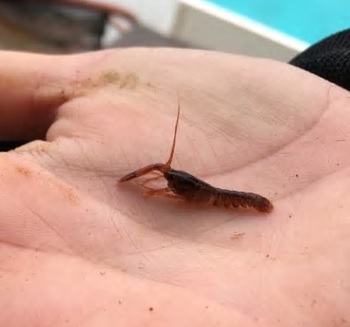
Warmer Northumberland Strait not good news for lobster fishery
As climate change warms the waters around Prince Edward Island, it could bring a new threat of disease to lobsters. University of Maine researcher Richard Wahle said his surveys of the waters around P.E.I. contain both good and bad news for the lobster fishery. There was good news in recent counts of baby lobster.,,, Warming waters around Rhode Island have led to shell disease and a drop in the lobster population there, he said. >click to read< 12:05
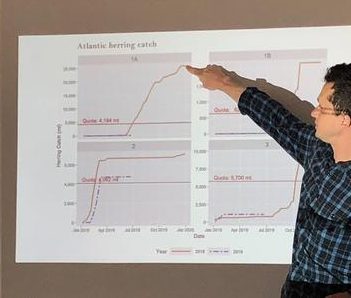
With herring shortage, lobster industry looks to other bait sources
The care and feeding of lobsters in the face of a bait crisis was the focus of a presentation at Maine Center for Coastal Fisheries ,,, With a shortage in herring, most lobstermen’s first choice to bait lobster traps, the industry is looking for solutions. “No bait is a big problem for a state that depends so much on lobster,” Stoll said. With about $60 million in ex-vessel landings value at the Stonington port in 2018, the commercial lobster industry supports thousands of local jobs, he noted. “Lobster is currently the most valuable fishery in the U.S., and 80 percent comes from Stonington.” >click to read< 10:58
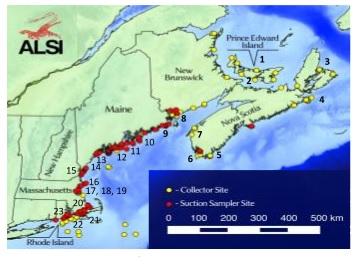
Coast to coast, companies team up to fund UMaine lobster research
A $75,000 gift from two seafood companies will fund a fourth field season for a University of Maine deepwater lobster settlement monitoring program. The deepwater research is an extension of the American Lobster Settlement Index, which was initiated in 1989 by Rick Wahle, a research professor in the School of Marine Sciences and director of the Lobster Institute. The index includes collaborators and monitoring sites from Rhode Island to Newfoundland.,,, The 2019 field season will be funded by a $50,000 gift from Ready Seafood Company, and a $25,000 gift from Santa Monica Seafood Co., a seafood distributor in California. (Thank You!) >click to read<11:42

Genevieve McDonald — a lobster boat captain and legislator — to graduate with highest distinction
Some people call Genevieve McDonald, Captain. Five months a year, she fishes for lobsters in Western Penobscot Bay. Others know her as Rep. McDonald. The Democratic legislator represents 8,000-plus people living on island communities around Stonington, Maine. In 2018, 67 percent of House District 134 voters elected to send her to Augusta. Students at Deer Isle-Stonington Elementary School, where she’s worked as a long-term substitute, call her Mrs. McDonald. To Evalina and Elise, the 1-year-old twins she parents with husband Cory, she’s Mom. And May 11 at Commencement at the University of Maine, she’ll be a college graduate, summa cum laude. >click to read<11:42
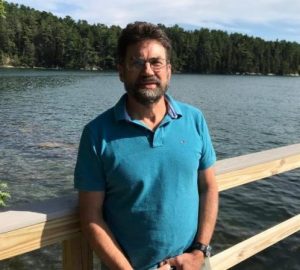
Wahle named director of the Lobster Institute at the University of Maine
University of Maine marine sciences research professor Richard Wahle has been named director of the University of Maine’s Lobster Institute, effective Sept. 1. He succeeds Robert Bayer, who has directed the institute since 1995 and is retiring from UMaine this year. Wahle joined UMaine’s School of Marine Sciences in 2009. He is based at the University’s Darling Marine Center, where he will continue to teach and conduct research. In 1989, Wahle founded the American Lobster Settlement Index, a program that now monitors the number of juvenile lobsters that settle to the seafloor at over 80 sampling sites from Rhode Island to Atlantic Canada. The index sheds light on the ocean processes that deliver lobster larvae to their rocky coastal nurseries, and serves as a predictor of trends in recruitment to the fishery. >click to read<10:36

Why Maine fishermen may be losing their knowledge of the sea
Maine fishermen have a long history of being involved in fisheries management. Communication between harvesters and policymakers has been instrumental in the development of rules and regulations that have helped to sustain the region’s coastal fisheries—from clams to alewives to lobsters. In part, this success results from the deep understanding of the natural environment held by fishermen. “Local ecological knowledge” is a term used to describe the collective perceptions held by a particular group about their environment, resulting from the transmission of cultural knowledge from one generation to the next, combined with regular and persistent interactions between people and the environment. >click to read<19:47
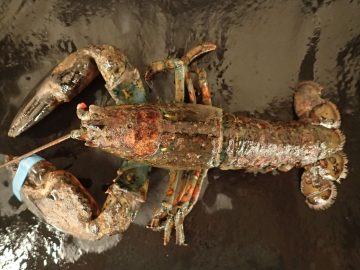
Lobster shell disease nudges up slightly off of Maine
A disease that disfigures lobsters has ticked up slightly in Maine in the last couple of years, but authorities and scientists say it’s not time to sound the alarm. The disease, often called epizootic shell disease, is a bacterial infection that makes lobsters impossible to sell as food, eating away at their shells and sometimes killing them. The Maine Department of Marine Resources said researchers found the disease in about 1 percent of lobsters last year. >click to read<16:41
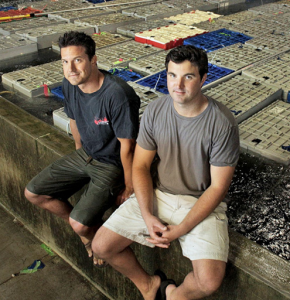
What’s happening to the lobster babies? Portland dealer will pay to get an answer
Scientists want to know why the number of lobster babies in the Gulf of Maine is declining when their numbers at every other stage of their life cycle remain high. That question is considered so important to the future of Maine’s $1.5 billion lobster industry that one of Maine’s 200 lobster dealers – Ready Seafood of Portland – is funding a university study to investigate what some scientists call the big disconnect. “What’s happening to the babies?” asked Brendan Ready. >click to read< 14:18
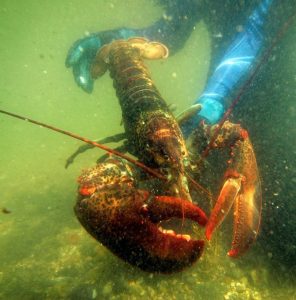
Benchmark study of lobsters begins
In 2015, data collected in a benchmark assessment of New England lobster stocks showed record-high abundance for the combined stocks of the Gulf of Maine and Georges Bank and record lows for the lobster stock of southern New England. Now, about three years later, the Atlantic States Marine Fisheries Commission is beginning preparations for the next American lobster benchmark assessment that is expected to be completed around March 2020. “We’re in the very early stages right now,” said Jeff Kipp, senior stock assessment scientist at the Arlington, Virginia-based ASMFC that regulates the Northeast lobster fishery. “The process will be mostly data-driven.” >click to read< 21:10

State disputes study that predicts sharp decline in Gulf of Maine lobster population
The state agency that oversees Maine’s marine fisheries is questioning the reliability of a new study that predicts a sharp decline in Gulf of Maine lobsters over the next 30 years. The Gulf of Maine Research Institute, the University of Maine and the National Oceanic and Atmospheric Administration built a computer model that predicts the population will fall 40 to 62 percent by 2030. But Patrick Keliher, commissioner of the Department of Marine Resources, won’t be using the model to help him decide how to manage the state’s most valuable fishery,,, >click here to read< 01:06 


































